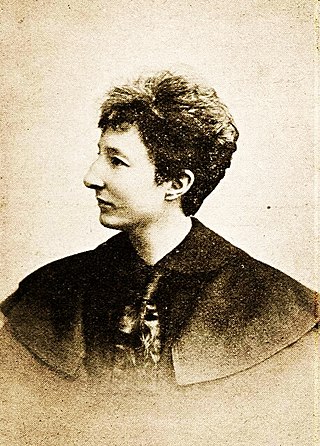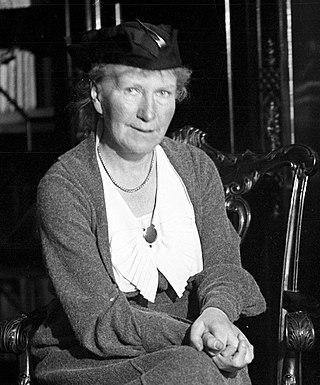
Gottlieb Duttweiler was a Swiss businessman and politician, founder of both the Migros chain of grocery stores and the Alliance of Independents party.

Lida Gustava Heymann was a German feminist, pacifist and women's rights activist.
Women in Switzerland gained the right to vote in federal elections after a referendum in February 1971. The first federal vote in which women were able to participate was the 31 October 1971 election of the Federal Assembly. However it was not until a 1990 decision by the Federal Supreme Court of Switzerland that women gained full voting rights in the final Swiss canton of Appenzell Innerrhoden.

Anita Theodora Johanna Sophie Augspurg was a German jurist, actress, writer, activist of the radical feminist movement and a pacifist.

Wilhelmine Theodore Marie Cauer, née Schelle, usually known as Minna Cauer was a German pedagogue, activist in the so-called "radical" wing of the German bourgeois feminist movement, pacifist and journalist. Alongside Anita Augspurg, Cauer was the most prominent figure in the radical feminist movement. In the 1890s she was the undisputed representative and had a special talent for winning over new and younger women to the feminist movement.

Marie Stritt was a German feminist and a leading force in the international and German women's suffrage movement. She helped worked towards woman's education and fought against state regulated prostitution. Stritt also worked for changes regarding divorce laws through the Woman's Legal Aid Society. She was a strong proponent of birth control and abortion.

Helene von Mülinen was a Swiss feminist regarded as the founder of the organized Swiss women's suffrage movement. She founded the Swiss women's suffrage movement, Bund Schweizerischer Frauenvereine (BSF), in 1900 and served as its first president between 1900 and 1904.

Emilie Gourd (1879–1946) was a Swiss feminist and journalist. She played a leading part within the Swiss women's suffrage movement. She was the president of one of the two leading Swiss suffrage unions, the Swiss Women's Association, during 1914–1928.
Gertrud Haldimann-Weiss (1907–2001), was a Swiss opponent of women's suffrage in Switzerland.
alliance F is the Federation of Swiss Women's Associations.
Fourth Conference of the International Woman Suffrage Alliance was held from 15 - 21 June 1908, at the Concertgebouw, Amsterdam, Netherlands.
FRAZ: Frauenzeitung was a feminist magazine published in Zürich, Switzerland, from 1976 to 2009. It was one of the early feminist publications in German-speaking countries and was the first feminist magazine in Switzerland.
Melitta Marxer was a Liechtensteiner activist who spent decades organizing and fighting for women's suffrage. She is most known for speaking at the Council of Europe in 1983 to gain international support for women's right to vote.
The Deutscher Verband für Frauenstimmrecht was a German women's organization for women's suffrage, active between 1902 and 1919. It was the first women's suffrage organisation in Germany and came to be one of the three most notable alongside Deutsche Vereinigung für Frauenstimmrecht (1911–1919) and Deutscher Frauenstimmrechtsbund (1913–1919). In 1916, it united with the Deutsche Vereinigung für Frauenstimmrecht and took the name Deutscher Reichsverband für Frauenstimmrecht. It was dissolved when women's suffrage was introduced in 1919.
Schweizerischer Verband für Frauenstimmrecht (SVF), was a women's organization in Switzerland, founded in 1909. It was one of the two main women's suffrage organisations in Switzerland, alongside the Bund Schweizerischer Frauenvereine (BSF). It was one of the main supporters of the yes campaign ahead of the referendum of 1971, in which women were granted the right to vote.
Schweizerische Aktionskomitee für Frauenstimmrecht, was a women's organization in Switzerland, founded in 1945.
A referendum on the introduction of women's suffrage was held in Switzerland on 7 February 1971. Only men were allowed to vote and the result was that 65.7% voted for the introduction. The outcome was expected, as several cantons had introduced women's suffrage in the years previous, and the Swiss Government and several political parties actively supported women's suffrage. It was the second national referendum after one in 1959, in which men voted against the introduction of women's suffrage.
Ida Monn-Krieger was a Swiss anti-Suffragette and president of the Federation of Swiss women against women's suffrage.
The Federation of Swiss Women Against Women's Suffrage was founded in 1959 after in a referendum of 1959 in which the Swiss men voted not to grant women the right to vote. It aimed to prevent women from receiving the right to vote. Its first president was Gertrud Haldimann, Ida Monn-Krieger succeeded her in 1967. It disestablished itself after in a referendum of 1971, women's suffrage was approved.






